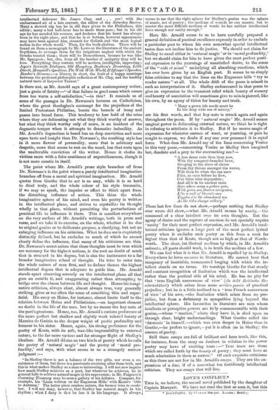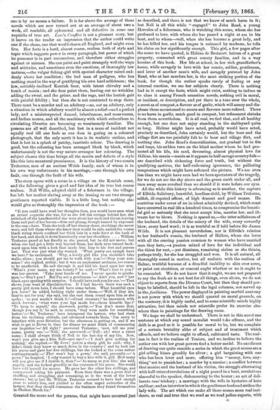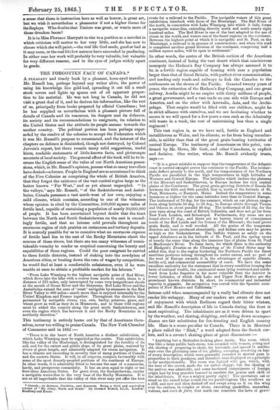LOVE'S CONFLICT.* This is, we believe, the second novel published
by the daughter of Captain Marryatt. We have not read the first or seen it, but this
• Loves Conflict, By k 1 neace Ilercyat. LuidOn: one is by no means a failure. It is far above the average of those novels which are now turned out at an average of about two a week, all readable, all ephemeral, and all defective in some one requisite of true art. Love's Conflict is not a pleasant story, but it leaves on the reader an impression that the author could write one if she chose, one that would charm all England, and might even live. Her forte is a hard, almost coarse, realism both of style and topic which suggests power in every paragraph, but power of which its possessor is in part unconscious, and therefore either struggles against or misuses. She can paint and paint strangely well the ways and attitudes, and sometimes even the emotions, of thoroughly low natures,—the vulgar fishing-girl with spotted character raised sud- denly above her condition ; the bad man of pedigree, who lets nothing stand in the way of gratifying his own hard selfishness ; the low, sottishly-inclined Kentish boor, with latent chivalry and a touch of mania ; and she does paint them, leaving out no wrinkles, adding the sweat, and the grime, and the rags, and the loutish gait with painful fidelity ; but then she is not contented to stop there. There must be a murder and an adultery—no, not an adultery, only a situation in which adultery would be almost a relief—and a perfect lady, and a misinterpreted damsel, inheritances, and mess-rooms, and Indian scenes, and all the machinery with which subscribers to circulating libraries are becoming so wearisomely familiar. The persons are all well described, but lost in a maze of incident not equally real till one feels as one does in gazing on a coloured photograph, that the only merit it has is its realistic outline, and that is lost in a splash of patchy, inartistic colour. The drawing is good, but the colouring has been arranged block by block, which unfortunately is not the way nature arranges her colouring. The subject chosen this time brings all the merits and defects of a style like this into unnatural prominence. It is the history of two cousin Trehernes, men of an ancient Welsh family, each of whom is in his own way unfortunate in his marriage, —one through his own fault, one through the fault of his wife.
The story opens with a scene in a village on the Kentish coast, and the following gives a good and fair idea of its true but coarse realism. Nell Willis, adopted child of a fisherman in the village, has left her mother slaving away at the ironing to see two strange gentlemen reported visible. It is a little long, but nothing else .would give so thoroughly the impression of the book :- "If you could have read her thoughts then, you would have seen what an arrant coquette she was, for as she left the cottage behind her, she twitched off the handkerchief she wore about her neck and throat, leaving them and part of her bosom—firm and plump, though tanned by exposure to the sun—bare. Then she took off her clumsy shoes, stockings she never wore, and left them where she knew they would be safe untied the coarse black string which confined her thick hair in a rude knot at the back of her head, and shook it down luxuriantly over her shoulders. . . . William Treherne gazed at her fixedly as she passed, but he did not move • but when she had got a little way beyond them, her dark eyes turned hack- ward upon him with a look that made him leap to his feet and pursue her. That was just what she wanted. 'What pretty sea nymph have we here ?' he exclaimed. Why, a lovely girl like you shouldn't take walks alone ; you should get me to walk with you.'—' Stop your non- sense!' she replied, archly; but it was an unpleasant archness, too coarse to be unaffected. He saw through it, and laid his hand upon her arm. 'What's your name, my sea beauty ?' he said.—' What's that to you?' was her answer. Take your hands off me. I never speaks to gentle- men.'—' Don't you ? But I'm not a gentleman.'—' Ain't you, now ?' her black eyes opening with surprise. should have took you for one.'—' That shows your want of discrimination. If I had known there was such a pretty girl down here, I should have come before. What beautiful eyes you have!' he added, looking right under them.—' Well, if they are, they're not for you,' she said, but she east them round upon him as she spoke; - so you needn't think it.'—ornel creature!' he answered, with mock fervour; 'what were your lips made for—those kissable lips ?' "To keep to myself,' she answered, pertly.—' You don't mean that, though you say it,' he said, in return, they were made for something better.'—' Mr. Treherne,' here interposed the lawyer, who had risen from his reclining attitude, and advanced towards them, I'm sorry to interfere with your flirtation, but the afternoon is getting on, and if we wish to get to Dover in time for dinner we must think of commencing our inquiries.'—' All right !' answered Treherne ; 'now, tell me your name, pretty one.'—' Nell,' she answered.—' Nell ; ah ! what a sweet name ; I shall always think of Nell to the last day of my life. Now, won't you give me a kiss, Nell—not one'?'—'I don't give nothing for nothing,' she replied.—' By Jove! you're a sharp girl, he said ; why, I didn't think they knew so much down in the country;' and he took out his purse and gave her five shillings, but she looked at the coins rather
contemptuously.—' That won't buy a gown,' she said, presently.—' A gown !' he laughed, I only wanted to buy a kiss with it, girl. How many
will you give me if I double it, then ?'—`As many as you like,' she said,
eagerly, and she looked greedily at the contents of his purse. She would have sold herself for money. He gave her the other five shillings, and commenced taking his payment. Even then there was a great deal of shuffling, and straggling, and screaming, as is the wont of the lower classes ; but at last Mr. William Treherne seemed to have had enough even to satisfy him, and yielded to the often urged entreaties of the lawyer, that they should commence the business they found themselves in Melton Marsh for."
Granted the scene and the persons, that might have occurred just
as described, and there is not that we know of much harm in it ; but Nell is all this while " engaged " to John Read, a young Hercules of a fisherman, who is watching this scene, whom she has professed to love, with whom she has passed a night at sea in his boat, and to whom—well, when she has become a great lady, and he has killed her, and his tongue is unloosed by madness, he tells his claim on her significantly enough. This girl, a few pages after the scene we have quoted, is Helene de Broissart, heiress of a great property, connected with great county families, and in a way heroine of this book. Her life at school, in her rich grandfather's house, while savagely in love with her cousin, soldier, gentleman, and lover of another man's wife, and savagely pursued by John Read, who at last murders her, is the most striking portion of the book, for though the author speaks rarely of feeling or any internal emotion, we see her subjects clearly. There is nothing bad in it except the facts, which might exist, nothing to induce us to class it among French sensation novels, nothing evil in moral, or incident, or description, and yet there is a tone over the whole, a scent as of compost,a flavour as of garlic, which will annoy and dis- please those accustomed to scents and flavours more refined. There is no harm in garlic, much good in compost, but refinement shrinks from them nevertheless. It is all real, we feel that, and all healthy enough, but one does not enjoy standing in the stableyard quite so long. Helene might have acted, probably would have acted, precisely as described, John certainly would, but the boor and the village flirt are too painfully felt to be boor and village flirt, and nothing else. John Read's demoralization, not gradual but in fits and leaps, his sudden turn on the blind mother whom he had pro- tected all his life, his mad, devouring, almost physical love for Helene, his mania—mania as it appears in half-savage country folk— are described with sickening force and truth, but without the qualifying motives, the half-redesming ignorance, the palliating temptations which might have softened the picture. We see even leas than we might have seen had we been spectators of the tragedy, for we do not see the sky above and the green earth under all, and turn away more revolted than we should if it were before our eyes.
All the while this history is advancing so is another, the capture of Elfrida Salisbury, beautiful, heedless child, by William Treherne, selfish, ill-reputed officer, of high descent and good means. He contrives under cover of an incident admirably devised, which must have occurred in real life a hundred times, to compromise the beauti- ful girl so seriously that she must accept him, marries her, and ill- treats her to blows. Nothing is spared us,—the utter selfishness of the husband, the details of the misery of the wife, every cowardly blow, every hard word ; it is as truthful as if told before Sir James Wilde. It is not pleasant nevertheless, nor is Elf ride's relation to her husband's cousin, the husband of Helene, whom she loves with all the craving passion common to women who have married men they hate,—a passion mixed of love for the individual and the thirst for rest, —yet elismictses, remaining sinless as she thinks, perhaps truly, for she has straggled and won. It is all natural, all thoroughly sound in motive, but all realistic with the realism of Balzac, truthful because of a dreadful inability to skin over sores, or paint out cicatrices, or conceal aught whether or no it ought to be concealed. We do not know that it ought, we are not prepared to say the fresh air is not best for all things, even ulcers, we do not object to reports from the Divorce Court, but then they should per- haps be labelled, should be left in the legal columns, not served up in the feuilleton. The power displayed in painting morbid anatomy is not power vith which we should quarrel on moral grounds, on the contrary, it is highly useful, and to some scientific minds highly attractive, but then minds not scientific prefer its exercise else- where than in paintings for the drawing.room.
We hope we shall be understood. There is not in this novel one sentence at which any sound moralist would take offence, and the drift is as good as it is possible for moral to be, but we complain of a certain brutality alike of subject and of treatment which offends, and we believe ought to offend, cultivated taste. The real- ism in fact is the realism of Tethers, and we incline to believe the author can with her great powers find a better model. No excellence of drawing can quite ennoble a series in which the great scenes are a girl selling kisses greedily for silver ; a girl bargaining with one who has been lover and more, offering him "money, love, any-
thing" not to punish her ; a murder by a maniac ; a conflict between that maniac and the husband of his victim, the struggle alternating with half-uttered revelations of a night passed in a boat, revelations shameful to the speaker, dishonouring to the hearer ; an act of deli- berate roué trickery ; a marriage with the wife in hysterics of hate and fear ; and an interview in which the gentleman husband strikes the lady wife. The art which can make all those scenes seem real inci- dents, so real and true that we read as we read police-reports, with a sense that there is instruction here as well as horror, is great art, but we wish it nevertheless a pleasanter if not a higher theme for its displays. Who doubts that Tethers was great, or wants more of those drunken boors?
It is in Misfit Florence Marryatt to rise to a position as a novelist in which criticism will matter to her very little, and she has now to choose which she will paint,—the real life God made, good or bad as it may seem, or the real life low natures have succeeded in producing. In either case her work will probably be very valuable, but valuable for very different reasons, and in the eyes of judges widely apart in grade.




































 Previous page
Previous page